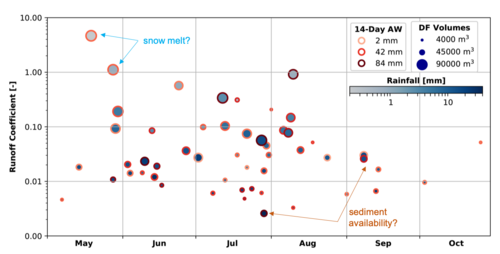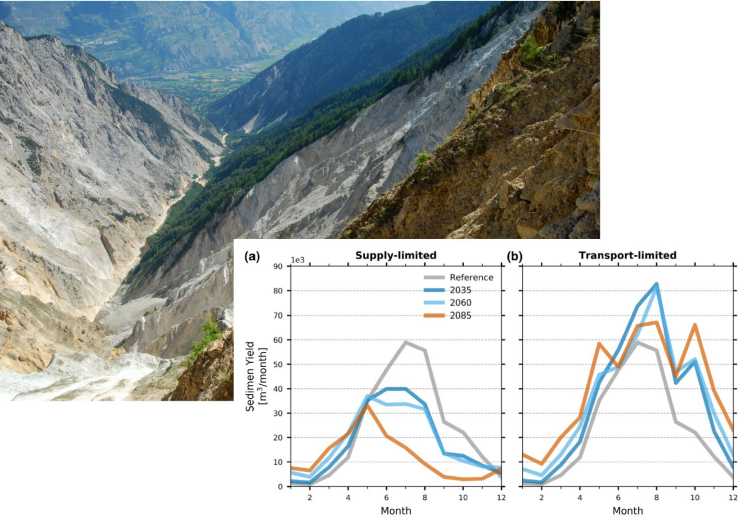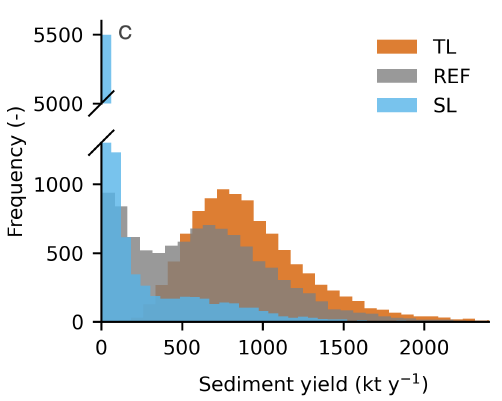SCAMM - Sediment Cascades in Alpine Mass Movements
Dates: 2018-2024
Funding: external page WSL research program CCAMM
PhD Student: Jacob Hirschberg
Principal Investigator: external page Brian McArdell
Investigator: Peter Molnar
Mountain regions are sensitive to climate change because of altered snow and glacier melt, permafrost thawing and an expected increase in the frequency of intense precipitation. This project was part of the strategic initiative at WSL "Climate Change Impacts on Alpine Mass Movements" to research these processes and develop optimum adaptive strategies to these types of changes. We conducted research on the gemorphological and meteorological conditions leading to debris flows and on numerical modelling of climate change impacts on sediment fluxes in debris flow catchments. The study site is Illgraben.
Meteorological and geomorphological drivers of debris flows

In the Illgraben catchment, we have investigated the role of various rainfall characteristics in debris-flow formation and found that while debris flows can be triggered by relatively small rainfall amounts, magnitudes of debris flow generally increase with higher initial wetness, and the size of debris flows decreases later into the year, possibly due to sediment exhaustion effects (Hirschberg et al. 2019). Debris-flow early warning systems often rely on rainfall intensity-duration (ID) thresholds as meteorological forcing. Using a 17-year record of rainfall and 67 debris flows in the Illgraben, we determined ID thresholds and associated uncertainties, and compared different approaches to estimate rainfall thresholds for debris-flows including machine learning (Hirschberg et al. 2021). This research contributed to improved prediction systems and understanding of uncertainty in geomorphologic prediction.
Hirschberg, J., McArdell, B. W., Badoux, A., and Molnar, P., (2019). external page Analysis of rainfall and runoff for debris flows at the Illgraben catchment, Switzerland. In Association of environmental and engineering geologists special publication: Vol. 28. Debris-flow hazards mitigation: mechanics, monitoring, modeling, and assessment, 693-700
Hirschberg, J., Badoux, A., McArdell, B. W., Leonarduzzi, E., and Molnar, P., (2021). external page Limitations of rainfall thresholds for debris-flow prediction in an Alpine catchment, Nat. Hazards Earth Syst. Sci. Discuss., https://doi.org/10.5194/nhess-2021-135
Modelling climate change impacts in Illgraben

In this research we combined new climate change projections CH2018 for Switzerland, a state-of-the-art stochastic weather generator (AWE-GEN), and a conceptual geomorphic sediment cascade model (SedCas) at the hourly scale, to investigate the changes in debris flows and sediment yields in the Illgraben. We showed that precipitation and air temperature changes are likely to lead to a reduction in both sediment yield (−48%) and debris‐flow occurrence (−23%) in the basin caused by a decrease in sediment supply from hillslopes by frost‐weathering. This work provided new insights into the effect of elevation on sediment production processes and underlined the reasons for the high uncertainty of sediment flux projections.
Hirschberg, J., Fatichi, S., Bennett, G. L., McArdell, B. W., Peleg, N., Lane, S. N., Schlunegger, F., and Molnar, P. (2021). external page Climate change impacts on sediment yield and debris‐flow activity in an Alpine catchment. Journal of Geophysical Research: Earth Surface, 126, e2020JF005739, https://doi.org/10.1029/2020JF005739
Sediment supply limitations and sampling issues

It is known that climate and sediment supply are critical for geomorphic systems, by amplifying, dampening or erasing environmental signals in sediment output records. Here we used a numerical approach consisting of a sediment cascade model (SedCas) and a stochastic weather generator (AWE-GEN-1D) to quantify climate forcing effects under a range of sediment supply regimes in a debris-flow catchment in the Swiss Alps (Illgraben). We showed that sediment yields estimated from short records are highly uncertain, that they tend to be underestimated in supply-limited (SL) compared to transport limited (TL) cases. Sediment supply limitations may induce long-term memory effects in sediment yields driven by the history of sediment storage. This raises the warning that determining geomorphic system response from short records may be grossly inaccurate.
Hirschberg, J., McArdell, B. W., Bennett, G. L., & Molnar, P., (2022). external page Numerical investigation of sediment-yield underestimation in supply-limited mountain basins with short records. Geophysical Research Letters, 49, e2021GL096440, https://doi.org/10.1029/2021GL09644.